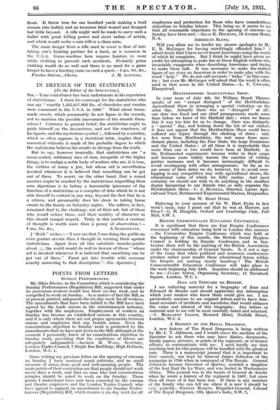POINTS FROM LETTERS SUNDAY PERFORMANCES.
Mr. Rhys Davies, in the Committee which is considering the Sunday Performances (Regulation) Bill, suggested that under its provisions workers would lose their six-day week, and be compelled to work on Sunday. As a matter of fact the Bill, as at present printed, safeguards the six-day week for all workers. The amendments that have been tabled to the Bill have been agreed by the trade unions in the entertainment industry, together with the employers. Employment of workers on Sunday has become an established custom in this country, and it is only where there are not proper agreements between unions and employers that any trouble arises. Even the conscientious objection to Sunday work is protected by the amendments that we have put down to the Bill, although at the moment I personally know of no conscientious objection to Sunday work, providing that the conditions of labour are adequately safeguarded.—ALFaan M. WALL, . Secretary, London Trades Council, 7 Staple Inn Buildings, High Holborn, London, W.C. 1.
Since writing, my previous letter on the opening of cinemas on Sunday I have received much criticism, and no small measure of abuse, from good and well-meaning people. The main points of their contention are that people should not work seven days a week, and that no man who had conscientious scruples should be asked to work on the Sunday. These points I understand have now been conceded by the cinema and theatre employers and the London Trades Council, who have agreed to support an amendment to the Sunday Perfor- mances (Regulation) Bill, which ensures a six-day Week for all employees and protection for those who have conscientious objections to Sunday labour. This being so, it seems to me that all reasonable objections to the opening of cinemas on Sunday have been met.—SmAs K. HOCKING, 10 Avenue Road.


































 Previous page
Previous page